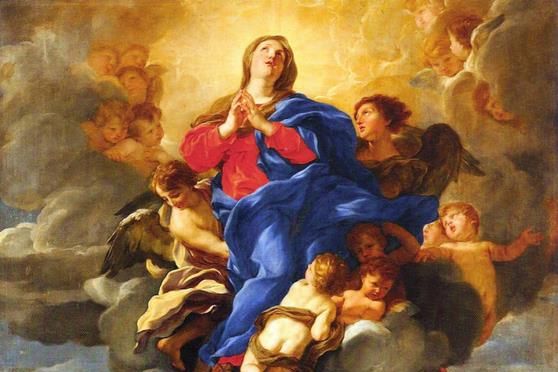Why the Queenship of Mary matters

 Mary. Artist Giovanni Battista Gaulli, Museu da Casa Brasileira. / Credit: Giovanni Battista Gaulli, Public domain, via Wikimedia Commons
Mary. Artist Giovanni Battista Gaulli, Museu da Casa Brasileira. / Credit: Giovanni Battista Gaulli, Public domain, via Wikimedia Commons Mundelein, Ill., Aug 22, 2024 / 04:00 am (CNA).
The Catholic Church annually celebrates the feast of the Queenship of Mary on Aug. 22. Most people, upon hearing of this celebration, would think of it as something rather sweet and sentimental, a quaint devotion for grandmothers with a taste for saccharine spirituality. But when we examine this feast as we should, through biblical eyes, a very different picture emerges.
The clearest scriptural indication that Mary of Nazareth is a queen is a remarkable passage in the 12th chapter of the Book of Revelation. The visionary author sees an extraordinary sign in the sky: a woman clothed with the sun, the moon at her feet, and a coronet of 12 stars on her head.
Twelve, of course, is a designation of the tribes of Israel, and the crown is a rather unambiguous indication that we are dealing with a royal figure. It soon becomes clear that this woman is not only a queen but, more precisely, a queen mother, for we hear that she is laboring to give birth to a king, one who is “destined to rule the nations with an iron rod.”
Both the queen mother and the infant king are involved in a terrible struggle. The visionary tells us that a fearsome dragon is poised to devour the baby as soon as it comes forth. But God sweeps the child up and brings him to the safety of the divine throne, while the mother flees to the desert where she finds refuge. In the wake of this, a war breaks out between “Michael and his angels” and the dragon and his angelic supporters. This image is, of course, symbolically rich and multivalent, but at the very least it indicates that the queen and her kingly son are protagonists in a spiritual warfare of some magnitude. They are, in a word, warriors.
Just before this passage, at the very end of Chapter 11 of the Book of Revelation (and remember that the chapter designations came many centuries after this text was originally composed), we find the vision of the heavenly temple. Amid flashes of lightning, peals of thunder, and a mighty hailstorm, the seer spies the Ark of the Covenant within the temple.
The ark, we recall, was the container of the remnants of the Ten Commandments, and hence the most sacred object for ancient Israel. Placed within the Holy of Holies in the Jerusalem Temple, the ark was understood to be the link between heaven and earth, the definitive bearer of the divine presence.
When King David brought the ark into the Holy City, he danced before it with reckless abandon. Moreover, at various points throughout its history, Israel brought the ark into battle, most notably when the priests marched with it seven times around the walls of Jericho, before those battlements came tumbling down.
Now the juxtaposition of the vision of the ark in the heavenly temple and the vision of the queen mother clothed with the sun cannot have been accidental. The author of the Book of Revelation is telling us that Mary, the bearer of the Word of God made flesh, was the Ark of the Covenant par excellence.
Indeed, when she visited her cousin Elizabeth, pregnant with the unborn John the Baptist, he leapt in his mother’s womb for joy, a beautiful infant imitation of the dance of David before the true ark. Both ark and queen are associated with spiritual warfare.
In her Magnificat prayer, recorded in the Gospel of Luke, Mary speaks of the God “who has cast down the mighty from their thrones and lifted up the lowly.” Like her Son, Mary does not fight with the puny weapons of the world but rather with the weapons of love, forgiveness, compassion, and provocative nonviolence.
Those who have experienced a Jesuit retreat based upon the spiritual exercises of St. Ignatius will recognize the “two standards” meditation. Ignatius asks the retreatant to imagine a great field of battle. Arrayed on one side, under the standard of the Church, is the army of Christ; and on the other, under the standard of Satan, is the army of the dark powers. Then Ignatius compels the retreatant to make a decision, indeed the most fundamental and important choice imaginable, the election that will determine everything else he will say and do for the rest of his life: Which army will you join?
Bob Dylan posed the same stark spiritual option in his 1979 song “Gotta Serve Somebody:” (“It may be the devil or it may be the Lord, but you’re gonna have to serve somebody.”) In other areas of life, a fair amount of nuance and subtlety is called for, but at the most basic level, where one determines the fundamental orientation of one’s life, things actually become quite simple and clear.
The feast of the Queenship of Mary has to do with this choice: Where do you stand in the great spiritual struggle? With whose army do you fight? Do you march under the banner of the Queen Mother and her Son, or with their enemies? Do you go out with the Ark of the Covenant or against it? Say what you want about those questions, but they are neither sweet nor sentimental.
This article was originally published on CNA on Sept. 11, 2012, and has been updated.






